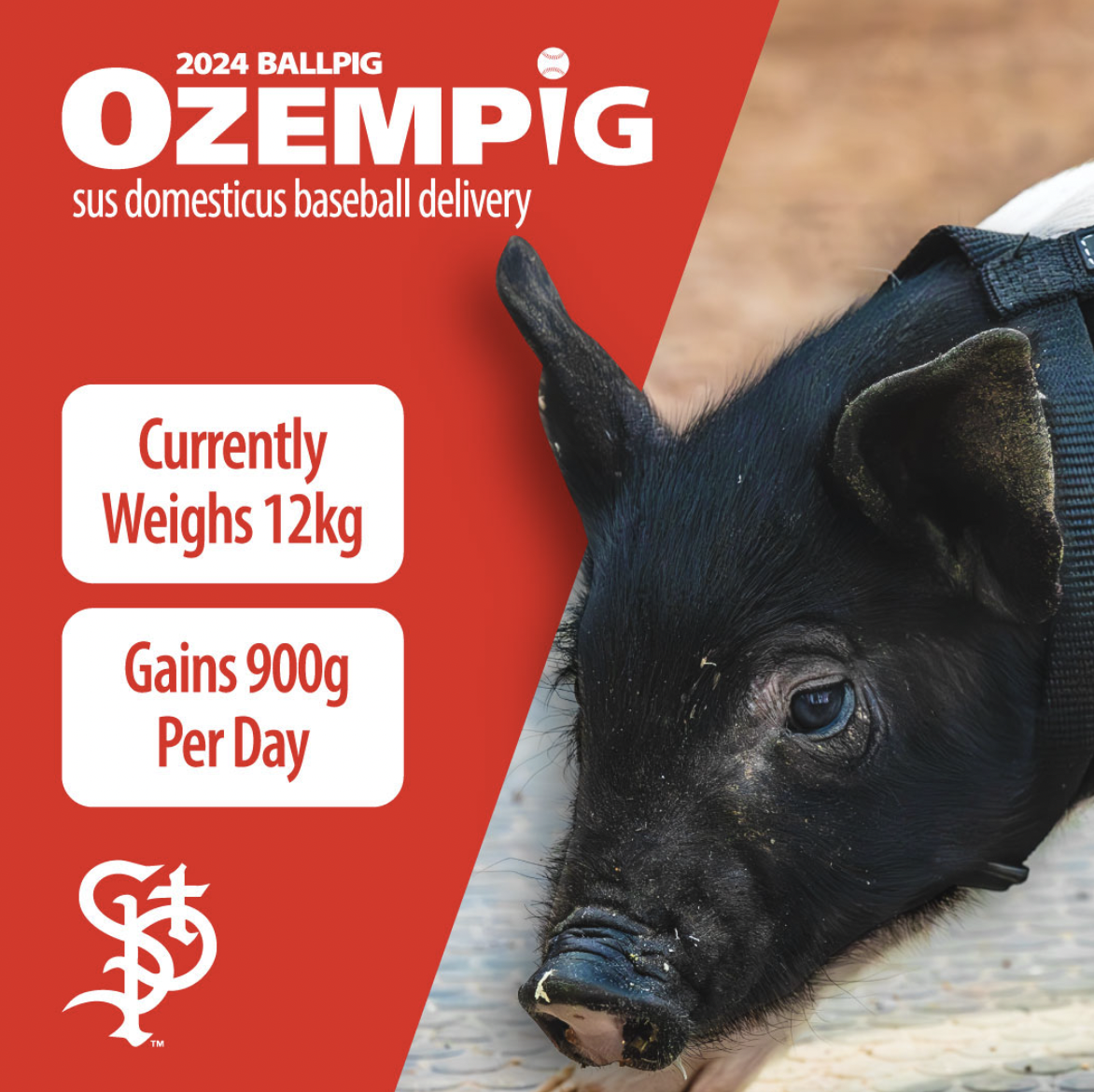Welcome back to The Flyover, your daily digest of important, overlooked, and/or interesting Minnesota news stories.
Oh No, Ozempig!
It’s a cherished Minnesota tradition. Each year at this time, the Saint Paul Saints announce the name of this season’s ball pig, which is typically a pun off a celebrity name or a current event, and we all have a chuckle or two about Garrison Squealer or Porknite or Slumhog Millionaire. But 2024’s sobriquet, Ozempig, has been met with quite a different reaction. The name, a play on the buzzy new diabetes med used for weight loss, Ozempic, sure seems like a nasty fat joke, and it’s drawing social media responses like this: “This sucks and lets fat people know they are welcome to be ridiculed.” It’s a strange misfire from an organization that, as far as I can tell, has managed to avoid riffing off this derogatory use of “pig” every year before now. To put this in baseball terms, the Saints did not hit a “home run,” but instead “struck out.”
Cargill: Still the Worst Company in the World
Looking at the numbers (30K readers and counting—that’s not bad for our lil ol’ site) I’ll guess that you’ve probably already seen Jay’s story yesterday about Minnesota’s current least favorite megabucks supervillain, Kathy Cargill. And as the attentive readers that you are, I’m sure you recall the big takeaway from the piece: The embarrassing exploits of wealthy individuals often overshadow the catastrophic harm inflicted by the corporations that made those people rich. “Cargill, the company, being labeled ‘evil’ and ‘the worst company in the world’ for decade-spanning allegations of squashing labor, killing family farms, and sprawling deforestation? Hardly gets any play,” Jay wrote.
If you’d like to know a little more about why industry watchdogs hold Cargill in such low esteem, the Minnesota Reformer offers up a Q&A today with Austin Frenick, the author of Barons: Money, Power, and the Corruption of America’s Food Industry. Frenick’s book looks at the damage done by the corporations that dominate various industries (dairy, coffee, meat) as well as our very own grain conglomerate, Cargill.
Part of the problem, Frenick says, is that the scale of Cargill’s power as a grain empire is unprecedented. You can’t even compare them to other corporations, he says. “They’re the closest thing we’ve seen to a modern day version of the 19th century British Empire.” Cargill not only undermines attempts at regulation, he says, but controls how the federal Farm Bill is designed, which leads to grain overproduction and environmental destruction. The Reformer also ran an excerpt from Frenick’s book in which he discusses the rise of Cargill, its resistance to the New Deal, and the ways it has worked to undermine progressive legislation throughout the years.
Speaking of Kathy C., the people of Duluth seem to be taking her pissy little comments about Cheerios in stride. Mayor Roger Reinert tweeted his breakfast, saying, "For the record...I'm more of a pancakes guy." Fitzger’s Brewhouse has released a lager called The Park Point People’s Pint, served with a “generous side of Cheerios.” And Duluthians have instituted the “Duluth Cheerio Challenge,” asking residents to donate a box or more of Cheerios to round out Minnesota Food Share Month. Now that’s how good neighbors behave, Kathy.
Report: Mayo’s Not Worth the Tax Breaks
The Mayo Clinic is displeased with its ranking in a new report from the Boston-based Lown Institute, writes the Strib’s Christopher Snowbeck. The report, released Monday night, says Mayo’s “fair share deficit” is one of the 10 worst among nonprofit clinics. What’s a fair share deficit? It’s the amount a clinic dedicates to charity care and community spending minus the value of the tax breaks it receives. Mayo spent about $478 million less on the community benefit programs that the report analyzed than it saved through tax exemptions in 2021. Minnesota’s Allina Health, Fairview, and HealthPartners clinics also came off poorly in the report.
Mayo disputed Lown’s methodology, saying it should have taken into account “spending on research, as well as training of health care professionals.” The Minnesota Hospital Association said Lown also omitted unreimbursed care to patients on Medicaid and other public health plans. "As a nonprofit medical center focused on patient care, research and education, Mayo Clinic provides substantial community benefit," Mayo said in a statement. Well, if you say so!
Local Man Featured in Horrific Nickelodeon Doc (But in a Good Way)
Even if you haven’t watched Quiet on Set: The Dark Side of Kids TV, you’ve likely heard talk about the new documentary, which looks at the widespread exploitation and abuse of child actors at Nickelodeon in the aughts. (I haven’t seen it yet, but my long-standing view is that it should probably be illegal to let kids act or sing professionally.) As with every big national story, there’s a local angle to be discovered if you look close enough, and this time Sheila Regan found that angle for MinnPost.
Fortunately, the relevant Minnesotan with whom Regan spoke with is neither an abused child nor an abusive adult. He’s Rick Ellis, the Inver Grove Heights writer who runs the TV website All Your Screens. The documentary drew from Ellis’s reporting on Dan Schneider, the prominent Nick showrunner for many of the programs where these abuses were committed, and Ellis also appears as a talking head. “There had always been stories about [Schneider], but nothing had really ever been published,” Ellis says. “And when he split with Nickelodeon, I just thought, I think there’s an interesting story here.” As Quiet on the Set demonstrates, Ellis’s instincts were on point.






